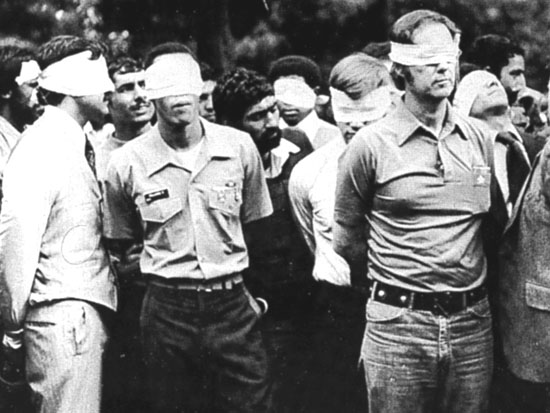The Iranian conservative bloc celebrated the 34th anniversary of the Iranian hostage crisis Monday, less than two months after Iranian President Hassan Rouhani discussed alleviating economic sanctions with President Barack Obama — sanctions that began in 1979 with crisis itself.
Videos By Rare
The Monday scene in Tehran could have been taken out of the now-infamous photos and videos of the protests outside the U.S. embassy in 1979 or the recent Hollywood depiction in “Argo,” which chronicles the equally famous CIA rescue of six Americans who escaped before the takeover.
A new generation numbering in the thousands chanted “Death to America” — just as they did in 1979 — in state-organized rallies across the country with some of the largest turnouts in years, with the main rally held outside the former U.S. embassy — now a museum of supposed crimes against Iran by the U.S.
State television encouraged participation and rallies included appearances by conservative lawmakers from Iran’s parliament, where anti-American and Israeli banners waved among burning American and Israeli flags and effigies.
In November of 1979 after thousands of Iranian protestors stormed the U.S. embassy in Tehran taking 52 American diplomats and foreign-service works hostage for what would stretch into 444 days, President Jimmy Carter froze about $12 billion in U.S.-held Iranian assets.
That expanded under President Ronald Reagan in 1984 with sanctions prohibiting international money lending and weapon sales to Iran during the country’s war with Iraq, and again in 1987 to include importing and exporting goods and services.
Even Rouhani — dubbed a moderate by Iran’s political definition — was inadvertently chastised by Iran’s supreme leader Ayatollah Khamenei after the 15-minute telephone call with President Obama outside of a United Nations General Assembly in New York, which Khamenei described as “not appropriate.”
Anti-Americanism is a core value among Iran’s extreme conservative wing, born out of the Iranian Islamic revolution that ousted CIA-installed Mohammad Reza Shah Pahlavi in 1979 and established the Islamic Republic of Iran.
The overthrow of the Shah — who the CIA only this year officially admitted to supporting — and subsequent exile to the United States where officials refused to extradite him where the key factors inciting the hostage crisis.
That does not stop even hard-liners like Khamenei from supporting the Rouhani effort to lift the economic sanctions, which have decimated the country’s economy in exchange for potential concessions to scale back select parts of Iran’s nuclear program.
Still, the Ayatollah issued a wary warning Sunday against trusting and negotiating with “an enemy who smiles.”
The U.S. and its allies plan to meet with Iranian representatives and continue talks later this week in Geneva.
“I have strongly supported the tough economic sanctions that have brought the Iranian regime to the negotiating table, and I urge the administration not to back away from these sanctions until Iran translates its rhetoric into concrete and verifiable action,” Republican Pennsylvania Sen. Bob Casey, co-chair of the Weapons of Mass Destruction Terrorism Caucus, said in a statement Monday.
“Previous negotiation efforts have yielded little but additional time for Iran to continue its support of terrorism and expand its nuclear program. In honor of those Americans who were taken hostage on November 4, 1979, we must continue to insist that Iran forgo its enrichment program and allow full access for international inspectors,” Casey said.
Related articles
- Anti-US protesters swarm former US Embassy in Iran (foxnews.com)
- Tehran Rally Shakes Fist at America and Outreach (abcnews.go.com)
- IRAN: Biggest Anti-America Rally In Years Occurs At Former US Embassy In Tehran (businessinsider.com)

